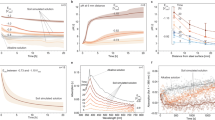Abstract
THE electrochemical mechanism of rusting is generally recognised, but our knowledge of the distribution and strength of the currents rests upon somewhat indirect methods. In the corrosion of a horizontal iron surface by filter-paper wetted with sodium bicarbonate solution, it has lately been found possible to study the current flowing horizontally through the paper without any interruption of the circuits. This is accomplished by shunting a small fraction through two non-polarising electrodes of superficially oxidised copper surrounded by filter-paper soaked in the same liquid and separated by waxed paper.
This is a preview of subscription content, access via your institution
Access options
Subscribe to this journal
Receive 51 print issues and online access
$199.00 per year
only $3.90 per issue
Buy this article
- Purchase on Springer Link
- Instant access to full article PDF
Prices may be subject to local taxes which are calculated during checkout
Similar content being viewed by others
References
Proc. Roy. Soc., A., 131, 355 ; 1931. 137, 343 ; 1932. 146, 153 ; 1934. Trans. Electrochem. Soc., 57, 407 ; 1930. 61, 441 ; 1932. 65, 249 ; 1934. Trans. Faraday Soc., 30, 417, 424 ; 1934. 31, 527 ; 1935. Korrosion u. Metallschutz., 6, 74, 173 ; 1930. 11, 121 ; 1935.
Author information
Authors and Affiliations
Rights and permissions
About this article
Cite this article
EVANS, U. The Electric Currents Flowing over Rusting Iron. Nature 136, 792–793 (1935). https://doi.org/10.1038/136792a0
Issue Date:
DOI: https://doi.org/10.1038/136792a0
Comments
By submitting a comment you agree to abide by our Terms and Community Guidelines. If you find something abusive or that does not comply with our terms or guidelines please flag it as inappropriate.



